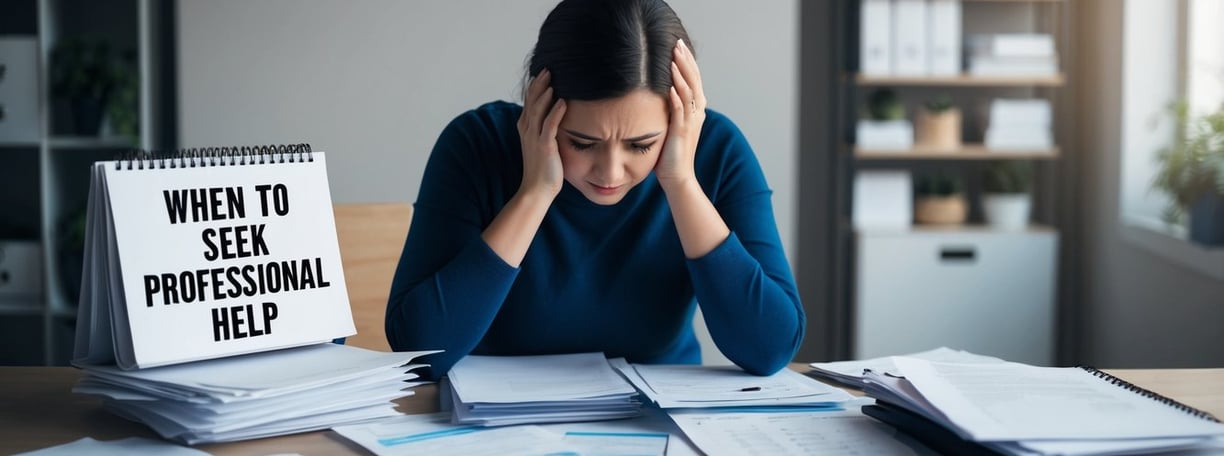How to Manage Depression Naturally: Science-Backed Strategies (2025 Guide) - Simple Remedies for Better Mental Wellbeing
Learn how to manage depression naturally with our 2025 guide. Explore science-backed strategies and simple remedies for enhanced mental wellbeing today!
MENTAL HEALTH
3/22/20256 min read


How to Manage Depression Naturally: Science-Backed Strategies (2025 Guide) - Simple Remedies for Better Mental Wellbeing
Depression affects millions of people worldwide, but there are natural ways to manage its symptoms alongside traditional treatments. Research shows that combining lifestyle changes, mindfulness practices, and proper self-care can significantly reduce depression symptoms in many people. These approaches don't replace medical treatment but can work alongside it to improve your overall wellbeing.
Living with depression can feel overwhelming, but small daily changes can make a big difference. From regular exercise and healthy eating to proper sleep habits and stress management techniques, these natural strategies are backed by science. They're accessible options that you can start implementing today.
Key Takeaways
Regular exercise, healthy eating, and consistent sleep routines can significantly reduce depression symptoms without medication.
Mindfulness meditation and cognitive behavioural techniques offer powerful tools for managing negative thought patterns at home.
Natural approaches work best when combined with professional support, especially for moderate to severe depression.
Understanding Depression
Depression is more than just feeling sad - it's a complex mental health condition that affects your thoughts, feelings, behaviours and physical wellbeing. This illness impacts millions worldwide and can disrupt even the most basic daily activities.
Symptoms and Diagnosis
Depression manifests differently in everyone. Common signs include persistent sadness, loss of interest in activities you once enjoyed, and feeling worthless or hopeless. You might also notice changes in sleep patterns - either sleeping too much or battling insomnia.
Many people experience physical symptoms too. These might include unexplained aches, digestive problems, or constant fatigue that doesn't improve with rest. Your appetite might change dramatically - some lose interest in food while others find comfort in overeating.
To receive a diagnosis, these symptoms typically need to persist for at least two weeks. Your GP will likely use standardised questionnaires to assess your symptoms and may rule out physical conditions that mimic depression.
Common Causes and Triggers
Depression rarely has a single cause. Rather, it's often the result of several factors working together. Your brain chemistry plays a significant role - imbalances in neurotransmitters like serotonin can affect mood regulation.
Genetics contribute too. If your parents or siblings have experienced depression, you may be more vulnerable. Research suggests about 40% of depression risk stems from genetic factors.
Life circumstances frequently trigger depressive episodes. Major life changes like:
Losing a loved one
Relationship breakdown
Job loss
Financial strain
Chronic stress depletes your mental resources over time. When I was working in a high-pressure job, I noticed how persistent stress gradually dimmed my outlook on everything.
Seasonal changes affect many people, particularly during winter months with reduced sunlight. This specific type, called Seasonal Affective Disorder, responds well to light therapy using special lamps (like the Lumie Vitamin L SAD Light - quite helpful during those grey UK winters).
Lifestyle Adjustments for Better Mental Well-being
Making small changes to your daily routine can significantly impact your mental health. These adjustments don't require medication but can help your brain create more feel-good chemicals naturally.
Dietary Habits and Nutritional Intake
What you eat directly affects how you feel. A diet rich in whole foods can help manage depression symptoms naturally.
Foods high in omega-3 fatty acids like salmon, walnuts and flaxseeds may reduce inflammation linked to depression. I noticed my own mood improved when I added more fatty fish to my weekly meals.
Try incorporating more Mediterranean diet staples such as colourful vegetables, olive oil, and lean proteins. Research shows this eating pattern is associated with lower depression rates.
Cut back on processed foods and sugar, which can cause energy crashes and mood swings. Instead, reach for complex carbohydrates like brown rice or sweet potatoes that release energy slowly.
A quality probiotic supplement like the Gut Health Plus tablets (£19.99 on Amazon) might help, as emerging research suggests a strong gut-brain connection.
The Role of Physical Activity
Exercise isn't just for physical health—it's a powerful tool for managing depression naturally. Even small amounts make a difference.
Aim for 30 minutes of moderate activity most days. This could be a brisk walk in the park, a quick cycle, or a dance around your living room. I found that morning walks completely transformed my outlook on difficult days.
Exercise releases endorphins—natural mood lifters that can provide hours of relief from depressive symptoms. It also reduces stress hormones like cortisol.
You don't need expensive equipment. Start with free YouTube workouts or try the Fitness Buddy resistance bands (£14.99 on Amazon) for home strength training.
Consistency matters more than intensity. Choose activities you enjoy so you'll stick with them long-term.
Importance of Sleep Hygiene
Poor sleep and depression form a vicious cycle, with each making the other worse. Breaking this cycle is crucial for recovery.
Establish a consistent sleep schedule—go to bed and wake up at the same times, even at weekends. Your brain craves this regularity.
Create a relaxing bedtime routine. Try reading (not on screens), gentle stretching, or using lavender essential oil in a diffuser like the VicTsing Ultrasonic Diffuser (on Amazon).
Keep your bedroom cool, dark and quiet. Consider blackout curtains or a white noise machine if your environment is noisy.
Limit screen time before bed—the blue light interferes with melatonin production. The Sleep Restoration eye mask (£12.99 on Amazon) has been a game-changer for me on restless nights.
Avoid caffeine after midday and alcohol before bed. Both disrupt sleep quality, even if they don't prevent you falling asleep.
Psychological Strategies
The mind plays a powerful role in managing depression. These mental approaches can help you build resilience and improve your mood without medication.
Mindfulness and Meditation
Mindfulness teaches you to stay present instead of worrying about the past or future. Research shows just 10 minutes daily can reduce depression symptoms by helping you observe thoughts without judgment.
I've found starting with guided sessions works best for beginners. The Headspace app (on Amazon UK) offers brilliant depression-specific meditations.
Try this simple exercise: Focus on your breathing for three minutes. When your mind wanders (it will!), gently bring attention back to your breath. This builds the mental muscle that helps interrupt negative thought spirals.
Body scan meditations are particularly helpful for depression as they reconnect you with physical sensations rather than remaining stuck in gloomy thoughts.
Cognitive-Behavioural Approaches
CBT helps you identify and challenge unhelpful thinking patterns that fuel depression. It's about becoming your own thought detective.
Start by keeping a thought journal. When you feel low, write down:
What happened
Your thoughts about it
How it made you feel
Look for thinking traps like:
All-or-nothing thinking ("I always fail")
Catastrophising ("This is the worst thing ever")
Mind-reading ("Everyone thinks I'm useless")
Challenge these thoughts by asking: "What evidence supports this?" and "Is there another way to see this situation?"
The "Feeling Good Handbook" by Dr Burns (on Amazon UK) teaches brilliant CBT techniques you can use at home.
Building a Support System
Depression thrives in isolation, but connection heals. Research shows strong social ties can reduce depression risk by up to 50%.
Don't wait until you feel better to reach out. Text a mate when you're struggling. Join a walking group through the NHS or try a depression support network.
Be specific when asking for help. "Could you come round for tea on Thursday?" works better than "Let me know if you're free sometime."
Online communities can provide support too. The Mind UK forums connect you with others who understand exactly what you're going through.
Remember, vulnerability isn't weakness—it takes courage to let others in when you're struggling.
When to Seek Professional Help
While natural strategies can be effective for managing mild depression, it's important to recognise when professional help is needed. Sometimes depression requires more than self-help techniques.
Recognising the Need for Therapy
Pay attention to warning signs that indicate you should speak with a healthcare provider. If you've tried natural approaches but still feel overwhelmed, or if your symptoms have lasted longer than two weeks, it's time to reach out.
Some clear indicators include:
Persistent feelings of hopelessness that don't improve
Thoughts of self-harm or suicide (if you're experiencing these, please call 999 or the Samaritans at 116 123 immediately)
Inability to handle daily tasks or care for yourself
Significant changes in sleep or appetite
I remember when my friend Sarah hesitated to see a therapist, thinking her depression would "just pass." Once she finally went, she told me it was like "finally having a torch in a dark tunnel."
Integrative Treatment Options
Many effective treatments combine professional care with natural approaches. Your doctor might suggest a treatment plan that includes both medical interventions and lifestyle changes.
Common integrative options include:
Therapy (CBT, interpersonal therapy) alongside regular exercise
Medication when necessary, complemented by mindfulness practices
Group support sessions combined with nutrition improvements
A good therapist will work with you to create a personalised plan. I've seen brilliant results with the Headspace Plus subscription (£49.99 on Amazon UK), which many therapists recommend as a supplement to in-person sessions.
Remember that seeking help isn't a sign of weakness—it's a brave step toward healing. Professional guidance can provide the structure and support needed for lasting improvement.








